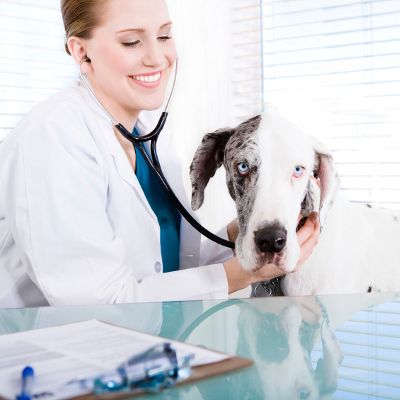 In 2004, dog owners around the United States were alarmed by the discovery of a new canine influenza virus isolated from Florida racing greyhounds. The new virus quickly spread across the country, infecting thousands of dogs. The disease is now a problem in humane shelters and boarding facilities, where dogs are in close contact, but can affect any dog. The best way to protect your dog is to know more about this virus and what you can do to keep your dog healthy.
In 2004, dog owners around the United States were alarmed by the discovery of a new canine influenza virus isolated from Florida racing greyhounds. The new virus quickly spread across the country, infecting thousands of dogs. The disease is now a problem in humane shelters and boarding facilities, where dogs are in close contact, but can affect any dog. The best way to protect your dog is to know more about this virus and what you can do to keep your dog healthy.
What Is Canine Influenza Virus?
CIV is in the same family of viruses as human influenza viruses. Analysis of CIV suggests that it probably evolved from equine influenza virus, which was circulating around Florida racehorses a few years before the first outbreak of CIV. CIV continues to mutate. The recent outbreak of canine influenza seen in early 2015 was due to a new viral strain.
What Are the Signs of Canine Flu?
Like many influenza viruses, CIV affects the upper respiratory tract (nasal passages, throat and trachea) but also affects the lower airways, leading to bronchitis and pneumonia. The most common signs owners see are nasal discharge and coughing. Similar to influenza in people, some dogs don’t get very sick when infected, and often get better without seeing a veterinarian. However, other dogs can develop life-threatening pneumonia, requiring hospitalization.
 How Is Canine Flu Diagnosed?
How Is Canine Flu Diagnosed?
Diagnosing CIV infection can be tricky. Because the signs of CIV are similar to many other types of respiratory disease, clinical signs alone are not sufficient to make a diagnosis. Precise diagnosis requires special testing.
One method is to measure blood-antibody levels specific for CIV. The test requires taking paired blood samples, drawn 10 to 14 days apart. If there is a significant increase in antibody levels in the second blood sample (typically a four-fold increase), then a diagnosis of CIV is confirmed.
CIV also can be detected by swabbing the nasal passages or throat of sick dogs. Using a special test called polymerase chain reaction, even small amounts of virus can be detected. If the PCR is positive, the dog is likely infected. However, a negative test does not completely rule out infection. The PCR test only can be performed during the first four days of illness or the results are unreliable.
For most dog owners and veterinarians, waiting for test results to start treatment simply isn’t practical. Since CIV specific tests require the proper timing to be useful, and a negative test doesn’t rule out infection, many veterinary CIV experts recommend testing only if there are strong reasons for needing to know a dog’s viral status.
 How Is Canine Flu Treated?
How Is Canine Flu Treated?
There is no specific treatment for CIV. In many dogs, the infection will resolve after a few weeks. For very sick dogs, hospitalization with supportive care may be needed.
With supportive care, the vast majority of even the sickest dogs recover from the infection. The good news is that CIV infection is rarely fatal.
Can Canine Flu Be Prevented?
A vaccine is available against one strain of CIV. The vaccine doesn’t stop infection, but does decrease severity of illness. CIV experts don’t recommend that all dogs get vaccinated, but the vaccine should be considered for dogs that have contact with lots of other dogs. Ask your veterinarian if the vaccine is right for your dog. Good environmental hygiene also can prevent spread of CIV. CIV is easily killed in the environment with common disinfectants. Dogs suspected of having CIV should be kept isolated from other dogs.
What Is Morris Animal Foundation Doing to Address Canine Flu?
Since 2005, Morris Animal Foundation has funded eight studies focused on increasing our understanding of CIV. The studies have looked at several aspects of canine influenza virus infections, including how the virus is transmitted; evaluation of new, rapid-detection tests; and viral mutation. Although we’ve made progress, we still have work to do to find a way to stop the virus from infecting more dogs.
At Morris Animal Foundation, we’re proud of our commitment to responding quickly to health crises affecting our pets.



